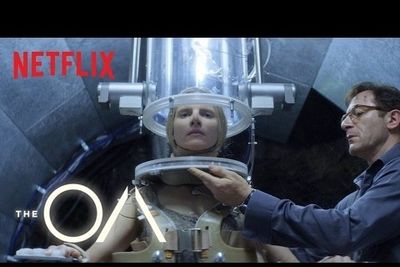The OA’s Brit Marling: “I Don’t Want to Be the Strong Female Lead”
Brit Marling deconstructs the hero's journey.

With her breakout Netflix series The OA, Brit Marling captivated viewers with her storytelling abilities and resistance to stereotypical hero's journey narratives.
Since The OA was canceled, she's shared wise observations about her experience in Hollywood and the inspiration behind the kind of storytelling she used in the series.
Marling began her career as an intern at Goldman Sachs, but she eventually left the corporate life and moved to LA to become an actress. At 24, after being rejected from a series of objectifying bit parts and trapped in an abusive relationship, she fell into depression.
But she took her frustration in an unexpected direction. She decided to write her own stories.
After she starred in two successful self-made indie films, the offers began to pour in, and she was even given the chance to play that most coveted of roles: the Strong Female Lead, the CEO, the badass female villain, or stuntwoman. But soon she began to understand that there were issues with this archetype, too.
"The more I acted the Strong Female Lead, the more I became aware of the narrow specificity of the characters' strengths — physical prowess, linear ambition, focused rationality. Masculine modalities of power," she wrote in a new op-ed for The New York Times.
The OA was meant to be an interrogation of the Strong Female Lead persona. It became an interrogation of the stories that underlie American culture. These stories praise success, aggression, independence, and monetary gain—but, Marling writes, "It's difficult for us to imagine femininity itself — empathy, vulnerability, listening — as strong."
In an era where films like Birds of Prey—which center female-led violence and provide catharsis to women who have been abused or are frustrated with the patriarchy—are still undeniably feminist triumphs and exceptions to the cinematic rule, Marling's vision of the future is a powerful alternative. Birds of Prey might be a feminist triumph, but it's still a response to abuse that glorifies masculine superhero narratives. Marling's ideas imagine a different sort of future, one where these kinds of violent reactions don't need to be made in the first place.
Instead of valuing one gender over the other, Marling concludes that we need to question binary structures in the first place. "How do we restore balance? Or how do we evolve beyond the limitations that binaries like feminine/masculine present?" she asks.
"I imagine new structures and mythologies born from the choreography of female bodies, non-gendered bodies, bodies of color, disabled bodies. I imagine excavating my own desires, wants and needs, which I have buried so deeply to meet the desires, wants and needs of men around me that I'm not yet sure how my own desire would power the protagonist of a narrative. These are not yet solutions. But they are places to dig.
Excavating, teaching and celebrating the feminine through stories is, inside our climate emergency, a matter of human survival. The moment we start imagining a new world and sharing it with one another through story is the moment that new world may actually come."
Marling was nervous about posting the op-ed. "2 days ago I woke up in the middle of the night and thought: I'm too scared to publish this," she wrote on Twitter. "I then rememberedAudre Lorde's 'The Transformation of Silence into Language and Action'—it gave me courage."
In the essay, she also interrogates silence. "But even in the silence I dream of answers," she concludes. Maybe the silence—listening, asking questions—can provide hints about the kinds of of stories we really need.